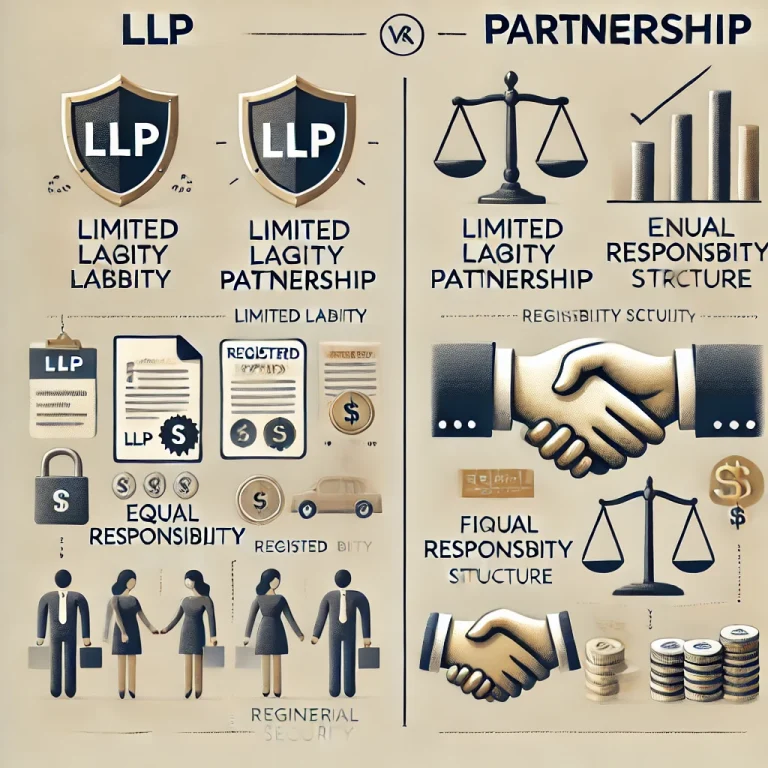A limited liability partnership and a partnership firm are two business structures through which people can collaborate for mutual financial gain. However, the two structures differ in aspects such as legal recognition, liability, and compliance requirements. While they are both collaborative business models, there are important differences between an LLP and a partnership that entrepreneurs must be aware of to make the right choice.
What is Limited Liability Partnership (LLP)?
A Limited Liability Partnership, or LLP, is an intermediate structure that has attributes of a partnership and elements of a corporation. Introduced as a legally recognized form of business entity, LLP provides partners with limited liability protection, which differentiates it from traditional partnerships. This form of structure has appealed to professionals who prefer a safer investment environment.
Key Characteristics:
- Separate Legal Entity: LLPs are treated as separate legal entities, giving them the capacity to hold property and enter into contracts in their own name.
- Limited Liability: Partners are liable only up to the extent of their investment, meaning personal assets are generally not at risk.
- Perpetual Succession: An LLP has continuity regardless of changes in partners.
What is Partnership Firm?
A partnership firm is governed by the Indian Partnership Act of 1932. It is a business where two or more persons agree to contribute capital, skills, and resources for running a business with profit and loss sharing. A partnership is simpler and more preferred by small businesses.
Key Characteristics:
- No Separate Legal Identity: A partnership firm is not a separate legal entity from its partners, making them personally liable for debts.
- Unlimited Liability: Partners bear unlimited liability, extending beyond their business investment to personal assets if necessary.
- No Perpetual Succession: The firm may dissolve upon the exit or death of a partner unless there is a specific agreement for succession.
LLP vs Partnership Firm: Key Differences
Let’s break down the differences between LLP and partnership in terms of liability, legal status, compliance, and other operational aspects.
1. Liability
- LLP: Partners have limited liability, safeguarding personal assets.
- Partnership: Partners face unlimited liability, which includes personal asset exposure.
2. Legal Status
- LLP: Recognized as a separate legal entity; can sue or be sued in its name.
- Partnership: Does not have a distinct legal identity; partners collectively own assets and responsibilities.
3. Compliance and Registration
- LLP: Requires registration with the Ministry of Corporate Affairs (MCA), adherence to the LLP Act, and regular compliance filings.
- Partnership: Registration is optional; governed by the Indian Partnership Act of 1932 with minimal compliance requirements.
4. Ownership and Management
- LLP: Partners can manage the firm, and ownership is transferred through a consent-based agreement.
- Partnership: Management and ownership are closely tied, often preventing easy transfer of ownership.
| Feature | LLP | Partnership Firm |
|---|---|---|
| Liability | Limited to capital invested | Unlimited, includes personal assets |
| Legal Status | Separate legal entity | Not a separate legal entity |
| Registration Requirement | Mandatory (MCA) | Optional |
| Management Flexibility | Flexible, governed by LLP Act | Limited by the partnership deed |
| Compliance Requirements | Annual compliance mandatory | Minimal, occasional if registered |
| Continuity | Perpetual succession | Ends with partner’s death or withdrawal |
Conclusion
The choice between an LLP and a partnership would depend on the different goals, scales, and risk capacities of the entrepreneurs. An LLP may be adopted for liability protection and a structured setup. A partnership may be considered by small business operators in need of simplicity and minimal compliance. Both structures offer distinct advantages, and one needs to understand the difference to make the right decision based on business objectives.
LLP and Partnership FAQs
Is an LLP better than a partnership firm?
Both LLPs and partnership firms have their pros and cons. LLPs offer limited liability and legal recognition, while partnership firms are simpler and less regulated.
Can LLP partners be held personally liable?
Generally, LLP partners are protected from personal liability, unlike in partnerships where partners bear unlimited liability.
How is LLP different from a company?
Unlike a company, an LLP combines elements of partnerships and companies but lacks complex compliance, making it ideal for smaller businesses.
Is it mandatory to register a partnership firm?
Registration for partnership firms is not mandatory under the Indian Partnership Act, but it provides legal benefits.
What is the cost difference in forming an LLP and a partnership firm?
LLP formation incurs MCA fees, while partnerships require minimal expenses, making partnerships generally less costly to establish.

